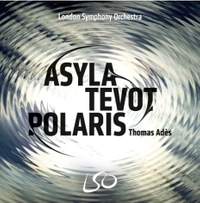Recording of the Week,
The LSO performs orchestral works by Thomas Adès
Thomas Adès is, for my money at least, one of the most consistently intriguing British composers currently writing, and yet recordings of his music are relatively few and far between, so I was thrilled to listen to a new disc of him conducting the LSO in four of his own works.

It has become almost a cliché to mention the diverse assortment of percussion instruments that his music requires, and yet I'm about to risk boring you by doing just that! He doesn't quite ask for everything but the kitchen sink, although he comes close in a couple of pieces: in Asyla, the main work on the disc, he asks for a bag full of knives and forks, and in Brahms (a setting of a poem by Alfred Brendel in which the ghost of Brahms haunts a house by playing the piano late at night), he includes a part for some baking trays! I'm always fascinated by the variety of sounds that he manages to think of, and he is very particular in what he is looking for (he specifically requests, for example, that the trays be flat baking sheets - "not roasting tins with deep sides", says a note in the score!).
Extraordinary sounds such as these can be heard right from the beginning of Asyla, where we hear not only tuned cowbells, a water gong, crotales and so on, but also an upright piano with the practice pedal depressed, and tuned a quarter-tone flat. It's a wonderful effect, and immediately creates a spooky, slightly unsettling mood that sets the tone for the piece.
It's not just in the percussion section where Adès comes up with interesting colours: in the woodwind he calls for a bass flute, bass oboe, and (perhaps one of my favourite instruments of all), a contrabass clarinet. The contribution that this latter instrument makes to the piece is remarkable, particularly in this recording as Adès allows it to cut through the texture, snarling and growling in its very lowest register.
The centrepiece of Asyla is the third movement, subtitled Ecstasio, in which (to return to the percussion!), Adès employs tuned bongos, hi-hat, bass drum, sandpaper blocks, and large paint tins to simulate a kind of thumping techno, "four-on-the-floor" drumbeat. It's a tour de force by the LSO percussion section, and has become my favourite movement of the piece!
The other thing that amazes me about his music in general, but particularly with these performances, is how natural and effortless it all seems, and yet when you look at the printed score it must be some of the most rhythmically complex and fiendishly intricate music I can remember seeing. With constantly changing time signatures, and orchestral writing that pushes every single player to the limit of what is possible on the instrument, it's quite something to hear it realised by such an accomplished ensemble and for it all to sound so in control.
As well as the aforementioned Asyla and Brahms, the disc includes two other large-scale orchestral works, Tevot and Polaris. The latter piece was new to me but was an extremely pleasant discovery: starting with a lonely piano representing the North Star as it travels through space, it also requires five groups of brass instruments to be placed in various positions around the concert hall, to create the sense of stars traversing massive distances. Although something of the effect is inevitably lost on disc as opposed to hearing it live, even here it's extremely beguiling, with the distant sound of the trumpets evoking beautifully the majesty and the scale of outer space. To put it simply, I think this is a stunning disc, and should be eagerly snapped up by anyone with an interest in British contemporary music!
Samuel Dale Johnson (baritone), London Symphony Orchestra, Thomas Adès
Available Formats: MP3, FLAC, Hi-Res FLAC



